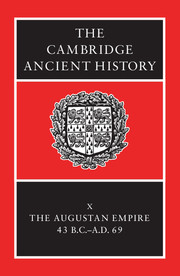13e - Britain 43 B.C. to A.D. 69
from 13 - The West
Published online by Cambridge University Press: 28 March 2008
Summary
PRE-CONQUEST PERIOD
Rome's first formal contact with Britain came with the expeditions of Iulius Caesar in 55 and 54 B.C. By then, most of the major late Iron Age migrations from Gaul to Britain had already occurred, although within Britain much political and cultural movement was still to take place. Caesar named only six tribes, among which were the Trinovantes and Cenimagni (Iceni?), with four more unnamed in Kent, and with the implication of a nameless eleventh, probably the Catuvellauni, ruled by the leader of the British opposition, Cassivellaunus. Other tribes which were to play a part in the period between Caesar and Claudius and immediately thereafter were the Brigantes, Corieltavi, Cornovii, Dumnonii, Atrebates and Dobunni in present-day England and the Silures and Ordovices in Wales. The Atrebates arrived in Britain after the Caesarian episodes, brought over by their king Commius, who, at first an ally of Caesar, later unwisely joined the unsuccessful rebellion of Vercingetorix in Gaul; the Dobunni are usually considered to be an offshoot of the Atrebates. The Catuvellauni gradually emerged as the most powerful tribe in south-east England, occupying an area roughly equivalent to the kingdom of Cassivellaunus. In addition, the four tribes which inhabited Kent eventually merged to form the single tribe of the Cantiaci. Apart from the tribes mentioned by Caesar and some other literary sources, most of our knowledge of their existence and geographical positions is gained from detailed study of the coinage which they minted.
Caesar's expeditions, even if they bore no long term success, nevertheless made Rome more aware of Britain's existence.
- Type
- Chapter
- Information
- The Cambridge Ancient History , pp. 503 - 516Publisher: Cambridge University PressPrint publication year: 1996
- 1
- Cited by



